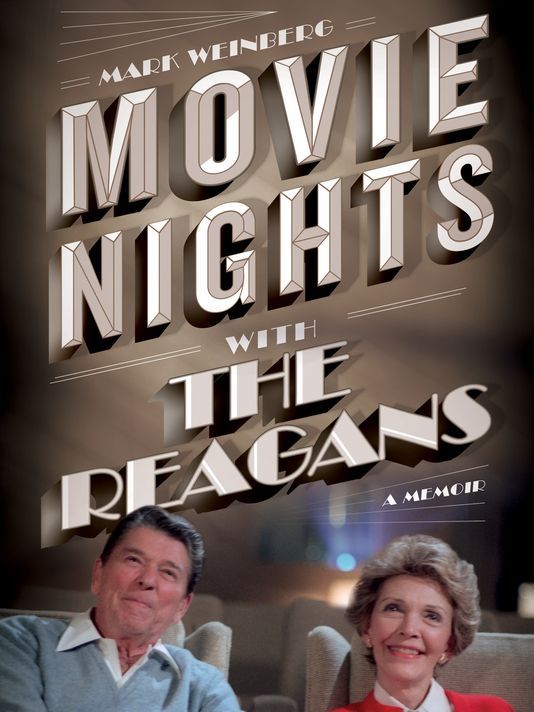A Movie Memoir

It's an apropos vehicle, to be sure: looking at the presidency of Ronald Reagan through the filtering lens of a movie projector. The president and first lady Nancy Reagan, both actors, loved to watch movies, new or old, whether they starred in them or not.
Nearly every weekend, most often at the presidential retreat at Camp David, the Reagans and invited staffers would gather for the movie of the week. Screenings included blockbusters of the 1980s, such as E.T. the Extra-Terrestrial, Top Gun, Rocky IV and Raiders of the Lost Ark. A few golden oldies made the cut as well, like Hellcats of the Navy, which starred the Reagans.
If edgier titles like Wall Street or Platoon were viewed, they are not included in "Movie Nights With the Reagans: A Memoir" (Simon & Schuster, 237 pp., ★★★ out of four), a glossy chronicle by Mark Weinberg, who served as a White House press aide throughout Reagan’s two terms and as the former president’s director of public affairs for two years thereafter.
Movie Nights is a sentimental meander through a simpler time, which the author frames with his rose-colored viewfinder. He freely admits to being a fast friend and fan of the “Great Communicator” and his wife.
Each chapter features a viewed movie, sometimes two or three, and these are used to illustrate aspects of Reagan’s reign. For example, Return of the Jedi inspires an examination of Reagan’s 1983 denunciation of the Soviet Union as “an evil empire,” along with how he prosecuted the Cold War.
The author employs the office comedy 9 to 5 to illustrate his boss’ belief in gender equality, pointing out that Reagan nominated Sandra Day O’Connor to become the first female justice on the U.S. Supreme Court. Weinberg also asserts that the president “was always a gentleman and had impeccable manners toward women.” Talk about the good old days.
There are moments of insight and intimacy. The reader gets to know the Reagans better — and politics aside, Weinberg makes them hard not to like. The first couple clearly were devoted to one another, which is quite winning, and both cried at the end of E.T. On the geopolitical side of things, the specter of nuclear war haunted Reagan and he worked tirelessly to make it less likely.
The contrasts with today are unavoidable. It was a time, the author points out, when a Republican president had friends across the aisle — with Democrats like Ted Kennedy and Tip O’Neill — and they passed bipartisan bills together. Reagan didn’t demonize or belittle his political opponents. Imagine that.
Weinberg knows his subjects well, but there is a price to pay for his cozy insider access, including occasional lapses into fawning prose. He writes, “Ronald Reagan liked many aspects of the Superman view of the world — specifically, truth, justice, and the American Way …” Good to know he wasn’t pulling for Lex Luthor.
The author also can’t shake his public-relations roots and bring himself to mention the Iran-Contra and Savings and Loan scandals or the Wall Street crash of 1987. He prefers to slime Ghostbusters by asserting that the phantasmagorical comedy makes a statement about government overreach (boo!).
That said, Weinberg largely succeeds in capturing a different time and a different president. Thankfully, he is not above trafficking in delicious Beltway gossip. But most of all, the nostalgia is palpable — enough to make a diehard Democrat wistful.